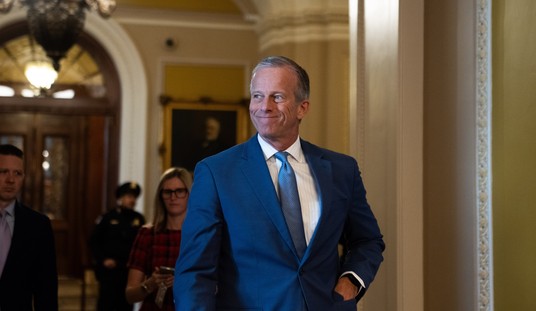Last month, The Atlantic magazine ran a powerful article by Peggy Orenstein about young men in America. Titled "The Miseducation of the American Boy," the article is poignant and deeply troubling. And yet I was struck by the fact that Orenstein misses some obvious causes and connections.
She mentions, for example, that the interviews she conducted over two years revealed young men who are broadly supportive of the dreams, aspirations and general equality of young women. They are tolerant of and form friendships with gay classmates. According to the contemporary narrative, these trends should portend progress and better emotional and mental health, right?
But that is not what Orenstein sees.
Instead, it is boys' opinion of themselves, of masculinity and manhood, that are stunted and crippled. They all knew the term "toxic masculinity." In Orenstein's words: "They could also easily reel off the excesses of masculinity. ... They'd seen the headlines about mass shootings, domestic violence, sexual harassment, campus rape, presidential Twitter tantrums, and Supreme Court confirmation hearings."
That brief statement got my attention. Mass murder is a consequence of "excessive" masculinity, as is rape. President Donald Trump is an exemplar of what is wrong with masculinity. Apparently, so is Associate Supreme Court Justice Brett Kavanaugh.
These are not statements of fact; they are opinions -- and strongly negative ones at that. Orenstein does not ask why the young men she interviewed are so aware of those (in their impressionable minds, widely held) views, or why they have internalized them so strongly.
She provides other, similarly distressing data. When asked in a PerryUndem survey what traits our society associates with masculinity, only 2% of male respondents chose "honesty and morality." Why is that? No answer is offered. When Orenstein asked her own interview subjects "what they liked about being a boy, most of them drew a blank." She quotes one interviewee who admitted: "I never really thought about that. You hear a lot more about what is wrong with guys."
Recommended
This is heartbreaking. We should be asking why America's boys feel the way they do, and why so much of what they hear about themselves as males is so negative. Orenstein is sincerely affected by the young men who trusted her with their deepest fears and anxieties. But she seems utterly oblivious to causes that should be obvious, given what the boys have told her.
Most notably, Orenstein completely overlooks the impact that the sexual revolution has had on the skewed perspective young people -- boys and girls -- have on their own identities and society's expectations of them. Orenstein asks the boys she interviews what constitutes "the ideal guy." When a surprising number of them mention "sexual prowess," she characterizes this as a viewpoint hearkening back to 1955.
Au contraire. That is a distinctly more modern phenomenon. Orenstein cites a recent survey in which young men report "more social pressure to be ever-ready for sex and to get with as many women as possible." She also reports that a contemporary "culture of adolescence," complete with a worship of "sexual conquest," has replaced perspectives of men as protectors and caregivers from earlier in the 20th century.
If you think the culture of sexual conquest is driven by the boys, you are seriously out of date. As a woman (and a mother), I was horrified by what the boys told Orenstein about the young women in their social lives. As young teens, these girls are "hooking up" with multiple boys and then comparing, mocking and humiliating them to friends and classmates, and on social media. I was frankly shocked by Orenstein's obliviousness to this. She decries what she views as the boys' misogyny. But not a word about the self-destructive promiscuity and deliberate cruelty of the girls.
Orenstein never asks the most obvious question: Why wouldn't a culture that worships promiscuous sex send the message to young men that their entire value revolves around sex? And consider the stated -- and hidden -- messages that young men get every day: Women should be able to sleep with as many men as possible. (Your girlfriend won't be faithful to you.) Divorce should be easy. (If your own father left and you're hurt by that, who cares? Men won't stay in a marriage. You shouldn't expect to stay in a marriage.) Dads are "deadbeats" or buffoons. (Mothers are more important than fathers.) Abortion is a constitutional right, and men should have no say. (Your children shouldn't mean anything to you. They can be destroyed whether you want that or not. You don't matter.)
It isn't that every negative, oppressive trend affecting American boys is an aftereffect of the sexual revolution. Some problems Orenstein mentions -- difficulty expressing emotions; fear of failure; "jock culture," with its bullying and vicious coaches -- have been around much longer.
But the sexual revolution -- which we were told would resolve the "battle of the sexes" -- has not only left those problems unaddressed but also created others, most notably, absent fathers.
This, too, Orenstein virtually ignores. But much evidence suggests that things like crime, mass shootings and sexual assault are not so much a function of toxic masculinity as they are absent masculinity. With no role models to demonstrate strong, healthy male behavior -- including respect for women, sexual self-restraint, honor and chivalry -- boys are left to fend for themselves, filled with untamed energy; the self-loathing and anger that comes from abandonment; societal messages of worthlessness; and the cultural push toward promiscuous sex (but with rampant accusations -- even presumptions -- that men are rapists). It is easy to understand why young men feel hopeless, frustrated and depressed.
Who is responsible for the miseducation of American boys? Our society. But changing that means admitting that the libertine behaviors we promised (or were promised) would bring fulfillment have wrought little but chaos and destruction.
Do we, as a society, have the courage to admit this, for the sake of our boys and our girls?























Join the conversation as a VIP Member